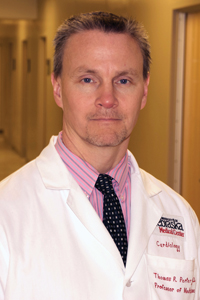 |
Tom Porter, M.D. |
NOTE: This profile is part of a series highlighting the 23 researchers who were named UNMC Distinguished Scientists or New Investigators for 2008. Each of these researchers will be profiled in UNMC Today leading up to a March 16 ceremony to recognize their achievements.
- Name:Tom Porter, M.D.
- Title: Professor and Hubbard Chair of Cardiology
- Joined UNMC: 1992
- Hometown: Scribner, Neb.
Describe your research in laymen terms, please.
Our research involves the utilization of microbubbles (ultrasound contrast agents) for both better detection of coronary artery disease during stress testing, and the utilization of diagnostic ultrasound and microbubbbles to dissolve blood clots that may cause heart attacks or stroke. We also use ultrasound and microbubbles to improve drug delivery to the brain.
What led you to pursue this area of research?
We have wanted to develop non-invasive techniques with ultrasound that would prevent patients from needing more costly invasive surgical techniques, and which could be available to patients more readily.
How do you see your research contributing to science?
Our research in developing ultrasound and microbubbles would make detection of heart disease more cost-effective and prevent the need for techniques that require radiation. The therapeutic applications could potentially provide rapid definitive treatment for heart attacks and stroke.
What is your hope for the next generation of scientists?
Heart attacks and stroke are the No. 1 and No. 3 killers of Americans today. Our hope is that the next generation of scientists would seek to advance health care delivery in the areas of prevention and improve non-invasive methods for the treatment of heart attacks and stroke.
Beyond grant funding, how do you measure success?
Success should be measured in how the research you do improves patient health care.
What would you tell a student interested in a research career?
I would tell them to pursue this and learn how to put their ideas into definable projects.
Do you have a hero/role model? If so, what do you admire most about this person?
My hero is my dad, who was a farmer in rural Nebraska. He taught me about sacrifice, and always encouraged me to “never accept things for just the way they are … always try to find ways to improve things.” He wanted to be a doctor but never was given the chance to go beyond a high school education. He ensured, though, that each one of his six children had an opportunity to have a college education. Without that sacrifice, I would never have become a doctor.
Tell us about your family and hobbies outside of the lab.
Spending time with my family is my hobby.
List three things few people know about you.
- I help out with an inner city youth group called Good News Bears, which teaches kids about Christianity and the value of an education.
- My favorite movie is Chariots of Fire.
- I am still a Yankees baseball fan, yes, even after the big money and steroid use.
Click here to see the UNMC Honors Web site, which features photos of profiles of the medical center’s Distinguished Scientists and New Investigators.